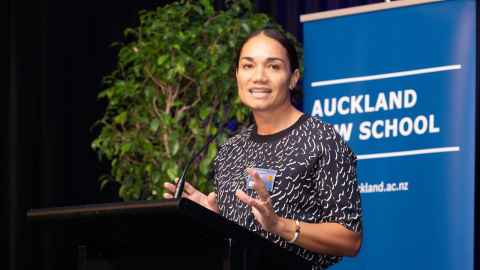Law Student Awards mark success
14 May 2019
A who’s who of the legal profession, law school staff, students and their friends and families, gathered together in the pavilion on the lawn of Old Government House to celebrate student success.

Dean Penelope Mathew welcomed everyone present acknowledging that there were many factors that aided their students.
“Our excellent teaching and mentorship has no doubt assisted these talented students, but we also want to acknowledge their parents and carers along with other friends and supports who no doubt have been the backbone of this enterprise. I also want to acknowledge the generous donors of the awards, many of whom are with us tonight. Your generosity is greatly valued, both by the students receiving the awards and by the Law School,” she said.
“As one of the best law schools in the world, Auckland boasted many high flying legal eagles including the Chief Justice of the Supreme Court of New Zealand.”
She said she’d been struck in the one month she had been here, by the fondness that so many leaders in the legal profession have, for their alma mater.
“Our students are multi-talented and these awards mark success in different areas – in scholarship, mooting, mock court competitions and similar activities, negotiation, client interviewing, and leadership roles within the student body,” she said.
Almost two hundred awards were presented at both undergraduate and postgraduate level with many students receiving more than one prize.
Tiana Epati, the newly elected President of the New Zealand Law Society, was the guest speaker. The youngest ever president, Tiana is also only the fourth women in 150 years elected to the role, the youngest, and the first of Polynesian descent. She told the gathered crowd the story of her father A'e'au Semi Epati to illustrate what it meant to her to be a lawyer.
Her father was raised by his grandparents in the village of Falealupo on the Island of Savaii in Western Samoa. He was bright and went to Samoa College. As a teenager he first learnt to speak English, taught by a VSA volunteer by the name of Bruce Robertson, who would later become Sir Bruce and a Court of Appeal Judge.
That was where her father first got the idea to study law. “He won a government scholarship and thanks to Otago University and an encouraging careers advisor he then confirmed his choice to study law,” she says.
Returning to Samoa to use what he had learnt, Semi quickly became known as someone who would very rarely turn someone away in need.
He would often say to Tiana ‘if you start something, finish it. If you find yourself in the middle of something you didn’t start but someone needs your help, never turn your back on them’.
“This meant for him, taking the hard and hopeless cases, which no one wanted, definitely the ones that didn’t pay… What I learnt early on as a child, is in those moments, I got to witness my dad’s ability, and with his efforts he changed the course of a person or a group’s journey,” she says.
“The commitment he would bring to each case and his belief that you had to be your best at all times because people were depending on you - my dad carried that commitment on to New Zealand when he came in the 1990s.”
Dad would say if you start something, finish it. If you find yourself in the middle of something you didn’t start but someone needs your help, never turn your back on them.
Tiana’s father had to restart as a lawyer, becoming a criminal defence lawyer in South Auckland.
“Those were difficult times. Dad was not your typical court lawyer from television. He was a short Samoan man with an afro, he spoke a little bit funny and he would often be mistaken for a criminal defendant when he went to court,” she says.
But she says he rarely complained and in 2002 Semi became the first person of Pacific Island descent to become a judge in New Zealand.
His advice to her when she chose the profession, ‘if you do this you must promise me you will be one of the good ones. What we do is far too important to be mediocre. People, organisations, iwi, they will come to you and they will rely on you to get it right...’
It is advice she says she’s never forgotten, applying it to her own practice.
“So we are here tonight to celebrate the best of the best and I applaud you all… In this room we have some of the best and the brightest that this country has to offer and shortly most, if not all of you, will become part of the profession too. To do so you will take an oath, you will make a promise like I gave my father, like I did when I became a barrister and solicitor of the high court, and this is where the real work begins,” she says.
Tiana urged the students to remember that being the best comes not only with privilege, but also with great responsibility.
“It means you will be sought out by employers, by peers, and by clients alike. So take it seriously, guard it and protect it. Being one of the good ones, requires a daily commitment and it also means helping those who are not so fortunate, paying tribute to the people who got you here.”
Media contact
Miranda Playfair | Media Adviser
Mob: 021 063 8393
Email: m.playfair@auckland.ac.nz